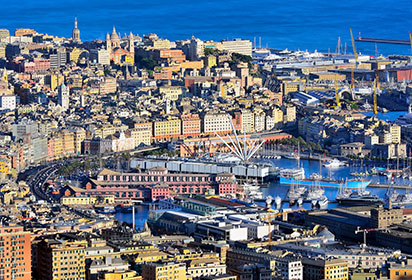Written by Rosie Whitehouse
Giuseppe Mazzini was born in Genoa when it was part of the French Empire and his father was an advocate of the ideas of the French Revolution. Genoa’s intellectual elite resented being handed over to the authoritarian monarchical Piedmont in 1815 and Mazzini, soon after graduating as a lawyer, started writing for newspapers that challenged the House of Savoy and were quickly closed down by the Piedmontese authorities.
In 1831, Mazzini joined the patriotic movement, the Carbonari, and he was arrested and imprisoned in Savona. On his release, he went into exile in Marseille, where he founded La Giovine Italia, Young Italy, a secret society who wanted to unify Italy into a liberal republic. Mazzini was convinced that this would be brought about by a popular uprising that would in turn spark a revolution across Europe.
By 1833, La Giovine Italia had 60,000 members and Mazzini launched the first of a series of failed revolts in Genoa. The uprising was brutally suppressed, its leaders executed and the director of the Genoa branch, Jacopo Ruffini, killed himself in prison. Mazzini was tried in absentia and sentenced to death. Another revolt failed in 1834 but undaunted, Mazzini now founded Young Europe, a movement ahead of its time, that envisaged a Europe of liberal republics linked in a federal state. It was a move that saw him arrested in both Switzerland and Paris.
In exile in England he continued to plot revolts. Above all he was impressed by the power of the press and was quick to see it as a potential weapon for garnering support, both in Britain and Italy. It was Mazzini who was to create the great myth of Garibaldi, the military leader of the Risorgimento. After another failed uprising in Genoa, Mazzini was sidelined in the story of the Risorgimento by Camillo Benso, the Piedmontese prime minister, who in 1856 now took a leading role, although he still remained active in Italian politics until his death in 1872. He’s buried in Genoa’s Staglieno cemetery.
For more on Ligurian history, take a look at our award-winning Liguria guide, the only standalone guide to the region.

